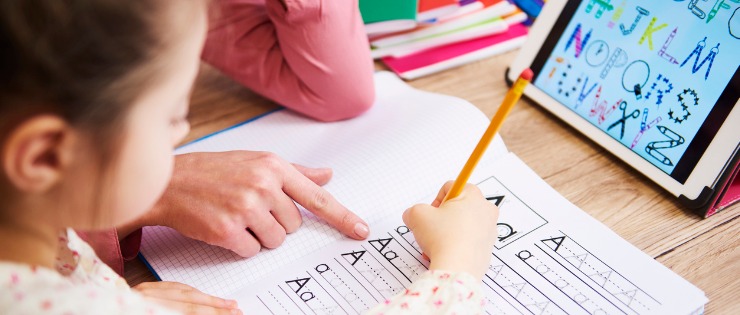
Discovering your child has a learning difficulty can be a hard time for any parent. Whatever learning difficulty it may be, no one wants to see their child struggle with school or life lessons. Supporting your child can be hard particularly in the early days when you’re still gathering information and advice. But a parent’s support and assistance can make all the difference for your child.
What Are Learning Difficulties?
Learning difficulties or learning disorders as they are also known is a term used to describe a number of learning problems. A child with a learning disorder sees, hears and comprehends differently to others. This makes it difficult to take in and apply new information.
The most common learning problems involve reading, writing, maths and listening. A learning difficulty doesn’t mean a child is any less smart than the average child, it means they need to be taught in a different way to overcome the difficulty. No two children are the same when it comes to learning difficulties. Because of the variations, there isn’t a single symptom that can be used to prove a problem, but there are signs to look out for.
Signs a Child May Have a Learning Difficulty
Early intervention is important for gaining the best long-term outcome for children. The signs differ depending on the age of a child but it’s important to be aware of them.

Before School Age
- Difficulty pronouncing words
- Difficulty following instructions
- Difficulty learning colours, shapes, the alphabet
- Trouble holding and colouring with a pencil or crayon
Aged 5-9 Years
- Joining sounds to make a word
- Difficulty learning maths concepts
- Struggles with learning to read
- Makes frequent spelling mistakes
Aged 10+ Years
- Poor handwriting
- Struggles with maths
- Poor organisation skills
- Doesn’t enjoy reading or writing
If you think your school-aged child may have a learning difficulty, speak to their teacher. The teacher may consult with another professional within the school to do an assessment if they’re unsure. Or the teacher may recommend an assessment with an outside professional to diagnose a learning difficulty.
If you have a child who is not yet at school and you have concerns about their learning abilities, speak to your GP. Your child may be referred to a speech pathologist or another professional for assessment.
While learning difficulties aren’t cured, a child with a learning difficulty can make faster gains with expert help and support. The earlier you seek help, the better the chance of making good progress.
Types of Learning Difficulties
There are a variety of learning difficulties, but the most common ones are dyslexia, dyscalculia, dysgraphia and ADHD.

Dyslexia
Dyslexia a reading learning difficulty. A child may struggle with reading, spelling and decoding words which can then affect their comprehension in other learning areas. A child with dyslexia may show early signs with delayed speech and language development, poor vocabulary and memory for names and letter names. Later they may have poor reading and spelling skills, difficulty understanding what is read and show differences between their verbal and written skills.
Dyscalculia
Dyscalculia is a learning difficulty that relates to mathematics. It may begin with poor counting skills, recognising numbers and maths facts. Later on their counting skills may improve but they find it difficult to learn maths concepts, remember maths facts, do mental maths and solve maths problems.
Dysgraphia
Dysgraphia relates to a child’s difficulty with one or more areas including handwriting, writing and spelling. Motor-related dysgraphia impacts on a kid’s ability in handwriting while language-based dysgraphia means they have difficulty expressing their ideas in writing. They may have good reading and oral language skills but poor written language skills. A child with dysgraphia may avoid writing, colouring tasks when young and have immature, poor handwriting skills in their later years of schooling.
Attention Deficit Hyperactivity Disorder (ADHD
While it’s not a learning difficulty, ADHD is a neurodevelopmental condition that affects the part of the brain that controls attention and concentration making it difficult for a child to learn.
The signs of ADHD include difficulty focusing and concentrating on a task and struggling to manage emotions like frustration. They may lose their personal belongings and act impulsively.
Autism
Autism isn’t a learning difficulty but children with autism may struggle with communication, reading body language cues and learning basic skills which can impact on their academic and social development.
Diagnosing a Learning Difficulty
Some learning difficulties are difficult to recognise and diagnose in children while others are more obvious at an early age. A parent may notice that their child is behaving or learning differently to their siblings or peers. But many learning difficulties are picked up by a teacher during the first two years of school. A teacher can recognise that their student isn’t progressing at an age appropriate level.
There can be a genetic link to learning difficulties. If a sibling, parent, aunt or uncle has a learning difficulty, there can be an increased chance that a child will have a learning difficulty than if there is no family history.
A number of specialists may be involved in assessing a child for a learning difficulty including psychologists, speech therapists, psychologists, neuropsychologists, and child psychiatrists.
You may be advised to have your child’s hearing and vision checked to ensure this isn’t the cause of any learning problems.

Working with Your Child’s Support Network
Depending on the type of learning difficulty and its severity, you may have a team of specialists involved in helping your child. A GP, teacher, education assistant, tutor, therapist, psychologist or psychiatrist may be involved. As a parent you may feel you don’t have the knowledge or skills to help your child much. However, you know your child better than anyone and will be a constant in your child’s life.
What you Can Do to Help Your Child with Their Learning Difficulty
There is plenty parents can do to help their child’s progress. In the early days it may feel overwhelming but hopefully it gets easier with time as your knowledge improves.
Learn As Much As You Can
The more you know about your child’s condition, the more you can assist. Do your research, contact support groups and ask questions of your child’s specialists to better understand your child’s difficulty. Find out what treatment options are available and then speak to your child’s school and specialists about these. Ask what you can do at home to assist with treatments.

Encourage Your Child With Their Strengths
Many children with learning difficulties don’t struggle in all areas. They may have a high level of interest or skill in one area and a weakness in another. Spending time on their strengths and things they enjoy is good for their self-esteem and can help in the area they find difficult.
Be Your Child’s Advocate
Some children with learning difficulties don’t get as much help as they require. They can go through their school life ‘falling through the cracks’, and not gain the best outcome. By being an advocate for your child, you will discuss with their school any services or treatments you think may help. You may need to seek additional professional treatment to accelerate their progress.
Work with Your Child’s Teacher
Children with a learning difficulty may need assistance from several people in their lives including their school teacher. A teacher may need to adjust the curriculum being taught and their expectations of a student with a learning difficulty.
Keep in regular communication with your child’s teacher so you know what work is being covered in class and what you can do to help at home can help. Reassure your child that it's ok to ask for help. No one is perfect, and their teacher is there to help them.
When your child is older, they may need Special Examination Arrangements (SEA) to allow them enough time or the right conditions to sit their exams. A child may need someone to read or scribe for them, for the exam to be printed differently or approval to use a software program to complete the exam.

Teach Your Child Life Skills
It’s important to take a balanced approach to teaching your child. They might be struggling with language or maths but they may also need your help with learning emotional or social skills.
Academic skills are important but it’s likely your child will draw on their social and emotional skills every day of their life. By teaching your child how to express themselves, they are better able to communicate with friends, family, teachers and peers.
Look After Yourself
Caring for any child is exhausting enough but if your child has a learning difficulty, parenthood can be even more complex. If you’re helping your child with homework, it can be a long and frustrating process for you both. Know when to take a break from teaching and come back later.
Spend time away from your child enjoying the company of friends so you can give yourself a rest. Helping your child with a learning difficulty can be an all-consuming process.
Quick Tips for Helping Your Child with Learning Difficulties
The most important role as a parent is to provide emotional and moral support to your child. This can be a frustrating and difficult time for everyone involved. Remind yourself that a learning difficulty isn’t too hard to overcome and to keep going.
- Recognise when your child is tired and needs to take a break from learning
- Don’t start with the most difficult tasks (even if that’s what they need the most practise), ease in with something they enjoy then move on to harder tasks
- Try to incorporate your child’s interest into the area of learning they find difficult
- Don’t compare your child to siblings, family or friends
- Acknowledge when your child feels frustrated and upset
- Have a routine so your child knows when they’ll do homework
- Praise your child for their effort rather than the outcome
- End each learning session with positive encouragement
- Provide emotional and moral support
- Remind your child that there are many successful and famous people in the world who have learning difficulties

Resources for Families of a Child with Learning Difficulties
There are websites available to provide information for families. If you have any concerns about your child’s development, speak to their teacher or visit your GP.